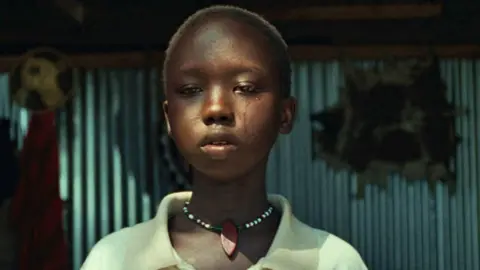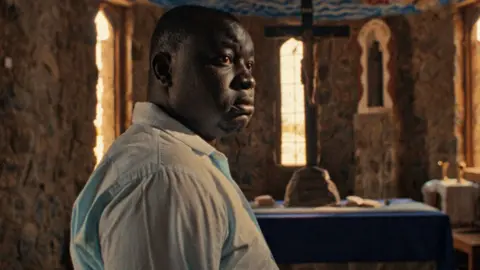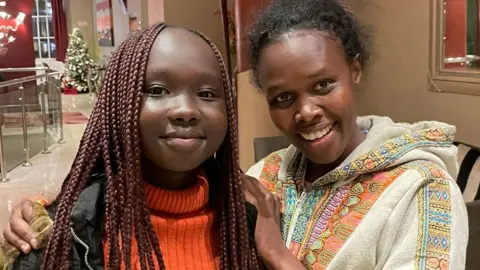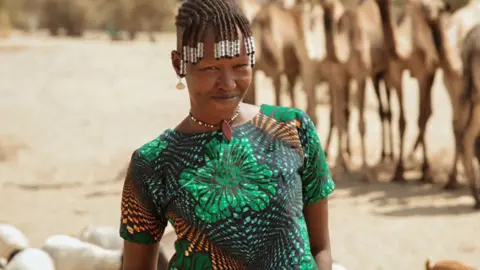BBC News

 Film crew
Film crewThe star of a 15 -year -old movie talks about a student who was forced to marry an old man, about her evangelical role – despite the fact that her community in northwestern Kenya may consider her betrayal and treats her as an outcast.
“I want the film to raise discussions on this, because it is not something that people want to talk about.”
She plays the 13 -year -old Nawi, the heroine of the film, who is taking place in the province of Torcana, a rural area on the border with Uganda and where the United Nations says that one in four girls get married before she is 18 years old.
“Many of my friends were forced to leave school, or they never went to school because one of them paid a dowry to marry them, so their parents married them,” she says.
Michelle, who grew up in Torcana where the film was filmed, these girls were taken into consideration when filming the feelings of Nawi – a performance that he won the African Film Academy Award for Best Promising Actress last November.
Like all local children who starred in the movie, you have not been acting before. When she participated in it, I thought it would only appear in school drama.
“I changed my life, but I don’t want to change my personality,” the teenager says.

 Film crew
Film crewIn the movie, after Nawi, 13, discovered that the results of her exams are the highest in the province, I heard that her father was selling her to a rich man named Shadrak for “60 sheep, eight beauty and 100 goats.” “.
Instead of accepting her fate, Nawi stains her blood with her wedding night to falsify the menstrual cycle and then escapes to fulfill her dream of going to high school in the capital, Nairobi.
Her father and Radrak are angry and tried to pursue her, but she managed to overcome them with the help of her brother.
However, she returned to her home in Torgana to courageously when she discovers that her new little sister had been returned to Radrak as an alternative bride.
There are many scenes that highlight the spread of child marriage, and how it is accepted despite being a lawlessness. According to the 2014 Kenyan Marriage Law, a person must be 18 years old to marry.
In one of the scenes, when Zouari, the Nawi colleague, did not attend the end of the year’s exam, the boys said in the separation that she was “busy having children.”
The story was written by Milka Sherotic, who won a writing competition launched by the German Kenyan NGO “Learning the Lions”.
Sherotic says her childhood was an inspiration for her first feature movie scenario when she grew up in Turkey.
When asked if the story was based on one person, she was so emotional at the point that she was unable to answer – but then tells how her sister was forced to marry at the age of fourteen.
At the age of fifteen she gave birth to her sister, but the child was ill and she died on her back.
“It has ended until she lived a life that she had no. A life that my father and her husband designed. These are the things that I wanted to change,” Sherotic told the BBC.
She says that some violent reactions to the movie “are very expected” in Torcana.
But what made her happy that she was already able to change the view of one person when she watched an early show via a video link for Nawi’s movie with her uncle, who is one of the most supportive of the marriage of children.
“After about 55 minutes, his eyes were wet. So, he was crying. I was cheerful inside because I thought: at least one man was touched,” she says.
“I realized the importance of novel novel and the strength you enjoy.”


Children’s marriage is not just a Kenyan issue – girls in sub -Saharan Africa are the most likely to marry children in the world, as one of every three girls married before the age of 18, according to the United Nations Children’s Children’s Agency.
As part of the United Nations sustainable development goals, the year 2030 was set as a deadline for completely ending child marriage, but UNICEF says that progress will need “great acceleration” to achieve this goal.
The rate of spread worldwide decreases – today, one in five women, between the ages of 20 and 24, married to childhood for approximately one in four women 10 years ago.
The fastest progress has been made in South Asia, where the risk of a girl in childhood decreased by more than a third.
But a recent UNICEF report stated that West and Central Africa, the region that is witnessing the highest prevalence of child marriage, has not made progress over the past twenty -five years. At the current pace, the region will take more than 200 years to eliminate this practice.
Toby Shamotzer, one of Nawi’s directors, says everyone who worked in the movie was passionate about the project, but the challenge now is to watch the movie.
“The message can be very beautiful, but if no one watches the movie, no one will hear the message,” he says.
The film was shown at the United Nations headquarters in New York last month – and Kenya chose it to present it to the Academy Awards, although it did not reach the brief list last week.
However, the directing team is happy to hold talks for an international publication in the United States, Canada, Europe, Central Africa and Australia.
The film was shown in Kenya late last year, and in Nairobi there was the longest movie ever for a local produced.

 Film crew
Film crewIn Turkey, Abu Morin, one of the Kenyan film directors, organized free shows for the Nawi movie in the Kakoma refugee camp.
She says that the response was largely positive, although the audience was mainly consisting of young people, and therefore the team plans to organize a truck to display the film to the elderly in local villages and obtain their reactions.
On the ground, in a joint initiative with Learning Lions, a new school has already been built by 300 girls.
Shamotler says that this matter was welcomed by the Torcana community, as attending at school is free and provides girls with meals in an area that witnessed a series of droughts that prompted many to the brink of famine.
Michelle believes that if more people see the movie, he will have the ability to change their lives.
“When you watch the movie, try to put yourselves in the place of Nawi, put yourselves in the place of all these 640 million girls,” she says.
“When you are young, you have a lot of dreams. I have a lot of dreams. And when someone comes and takes it from it, this is the worst feeling ever.”
You may also be interested in:

 Getty Emiguz / BBC
Getty Emiguz / BBC
https://ichef.bbci.co.uk/news/1024/branded_news/2ee5/live/e87d78a0-da5f-11ef-a37f-eba91255dc3d.jpg
2025-01-26 01:51:00







